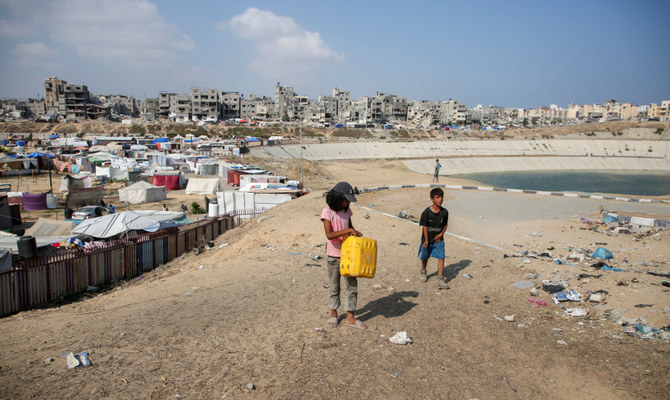GAZA STRIP, Palestinian Territories: Wastewater pumping stations in one of Gaza’s main cities stopped working on Tuesday because fuel had run out, the local authority said, expressing fears that disease could rapidly spread.
Tens of thousands of people displaced by the Israel-Hamas war have sought shelter in Deir Al-Balah, and city authorities said more than 700,000 people could be at risk from a “health and environmental crisis.”
“Deir Al-Balah municipality announces the halt of water waste pumping stations because stocks of fuel necessary for their functioning are exhausted,” said a city statement.
It predicted that “roads will be flooded by waste water” and “diseases will spread.”
Gaza has had no electricity supplies since the war was unleashed by the October 7 Hamas attacks on Israel. The fuel-powered waste plants treat water that is then put into the Mediterranean.
“Nineteen pits and two large reservoirs are unusable in Deir Al-Balah,” Ismail Sarsour, an official with the city’s emergency committee, said ahead of the release of the statement.
He said the stations handle wastewater for more than 140 points of shelter where tens of thousands of people have taken refuge.
The Palestinian Authority’s water department, the PWA, which is based in Ramallah in the occupied West Bank, said recently it had arranged for tens of thousands of liters of fuel to enter Gaza.
But Palestinian experts said the water crisis is so deep that the fuel alone would not help. Sarsour and the experts said there was also a critical shortage of spare parts to repair damaged infrastructure.
Israel said this month that, with help from the UN children’s agency UNICEF, it has connected one desalination plant in southern Gaza to its electricity network. It is unclear if the plant has started working.
The Palestinian Authority also said Tuesday that it expected electricity supplies to start again in central Gaza in “coming days” to power public infrastructure. Israeli authorities have not confirmed the move.
Israel’s military offensive since October 7 has killed at least 38,713 people, mostly civilians, according to figures from Hamas-run Gaza’s health ministry.
The war began with Hamas’s unprecedented attack on Israel which resulted in the deaths of 1,195 people, mostly civilians, according to an AFP tally based on Israeli figures.
Gaza city says water treatment stops, 700,000 face health ‘crisis’
https://arab.news/gzqgj
Gaza city says water treatment stops, 700,000 face health ‘crisis’

- “Deir Al-Balah municipality announces the halt of water waste pumping stations because stocks of fuel necessary for their functioning are exhausted,” said a city statement
How the Zayed Award amplifies the work of its honorees to further their humanitarian missions

- This year’s award recognizes Barbados PM Mia Mottley, World Central Kitchen, and young innovator Heman Bekele
- By receiving the award in 2024, surgeon Sir Magdi Yacoub has been able to expand his life-saving care to underserved communities
DUBAI: In a world grappling with crises ranging from conflict and humanitarian emergencies to economic vulnerability and climate change, the Zayed Award for Human Fraternity stands as a beacon of hope.
Since its establishment in 2019, the award, which includes a $1 million prize, has recognized individuals and organizations whose work embodies the universal values of peace, solidarity, and human dignity.

This year, the 2025 honorees — Barbados Prime Minister Mia Amor Mottley, humanitarian relief organization World Central Kitchen, and 15-year-old health innovator Heman Bekele — have each demonstrated a commitment to making the world a better place.
The Zayed Award for Human Fraternity, named in honor of Sheikh Zayed bin Sultan Al Nahyan, the late founder of the UAE, has become a symbol of recognizing and amplifying transformative humanitarian efforts worldwide.
The award is one of the outcomes of the dialogue between the Grand Imam of Al-Azhar Ahmed Al-Tayeb and Pope Francis, which led to the signing of the Document on Human Fraternity in Abu Dhabi in 2019.
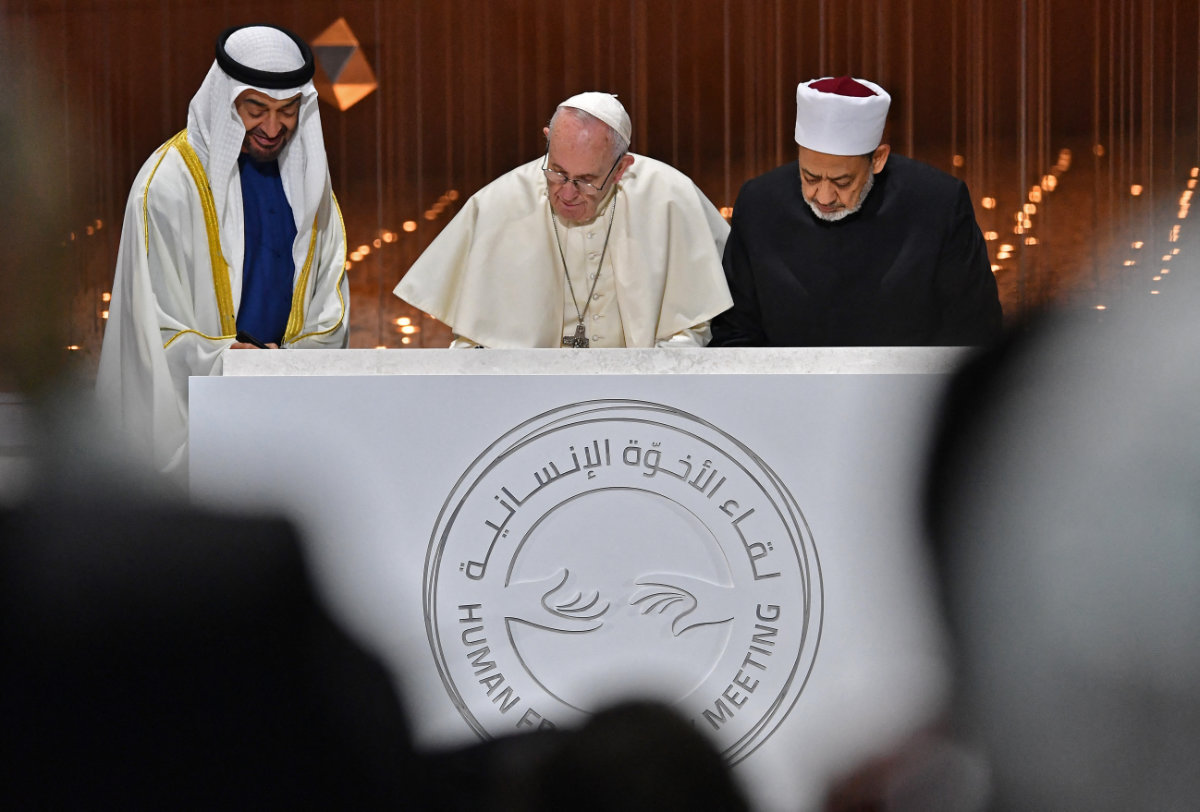
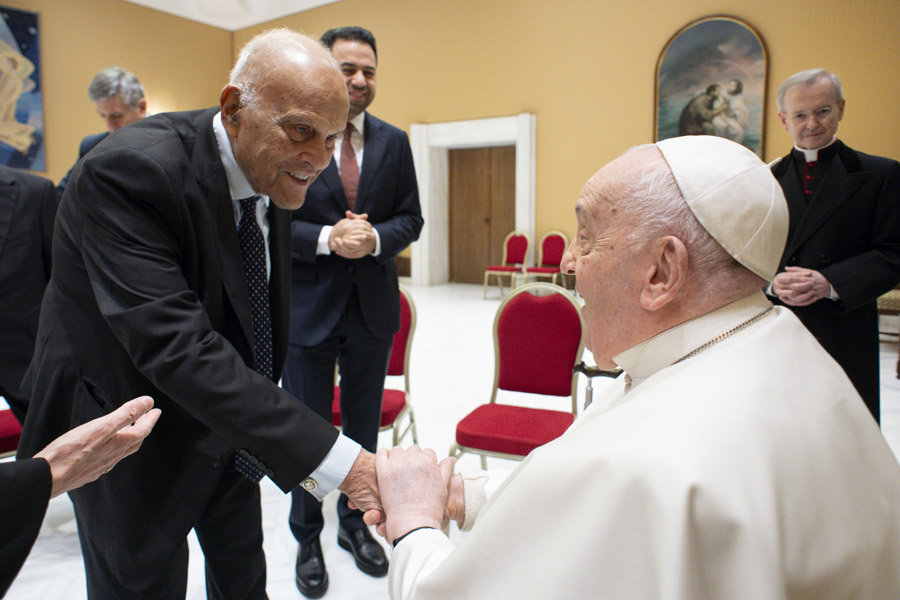
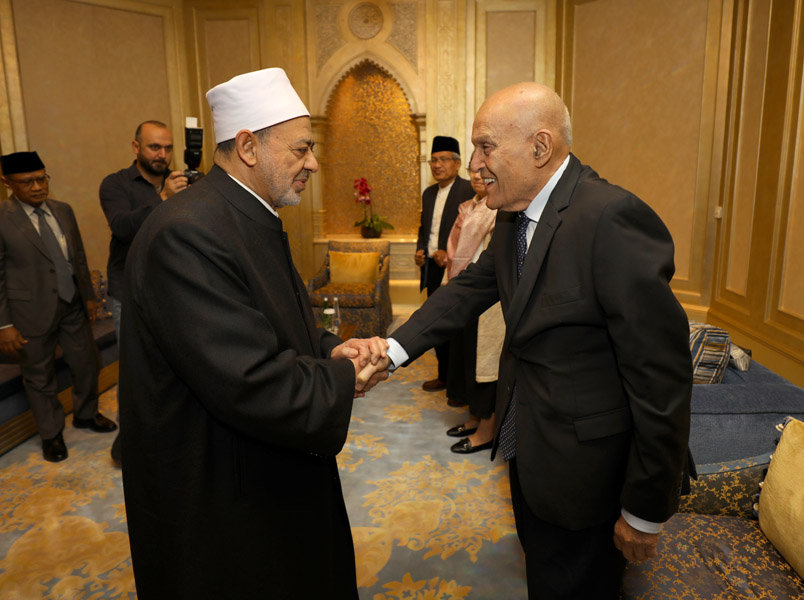
This year’s three recipients will be honored at a ceremony at the Founder’s Memorial in Abu Dhabi on Feb. 4.
The selection process for the annual award is rigorous, with an independent jury reviewing hundreds of nominations from individuals and organizations dedicated to advancing human fraternity.
“It is the judging committee’s honor to spotlight three outstanding honorees who are addressing some of today’s most urgent challenges — climate resilience, humanitarian relief, and youth-driven innovation,” Judge Mohamed Abdelsalam, secretary-general of the Zayed Award for Human Fraternity, said in a statement.
2025 HONOREES
• Barbados Prime Minister Mia Amor Mottley has long advocated for climate resilience, global financial reform, and renewable energy.
• World Central Kitchen has provided more than 300 million meals in crisis zones, including 70 million meals in Gaza since 2023.
• Heman Bekele developed an affordable soap to treat early-stage skin cancer, demonstrating the power of youth-led solutions in healthcare.
“This year’s recipients demonstrate that transformative work can be undertaken at any age, in any place in the world, and in any field.”
Mottley has gained international recognition for her relentless advocacy in addressing climate change and her leadership in pushing for financial reform to support vulnerable nations.
Her efforts through the Bridgetown Initiative — a bold call for restructuring global financial systems — aim to ensure that developing nations have equitable access to climate resilience funding.
“She has committed to achieving 100 percent renewable energy for Barbados by 2030, investing in solar, wind, and other clean energy sources,” the award committee said in a statement.
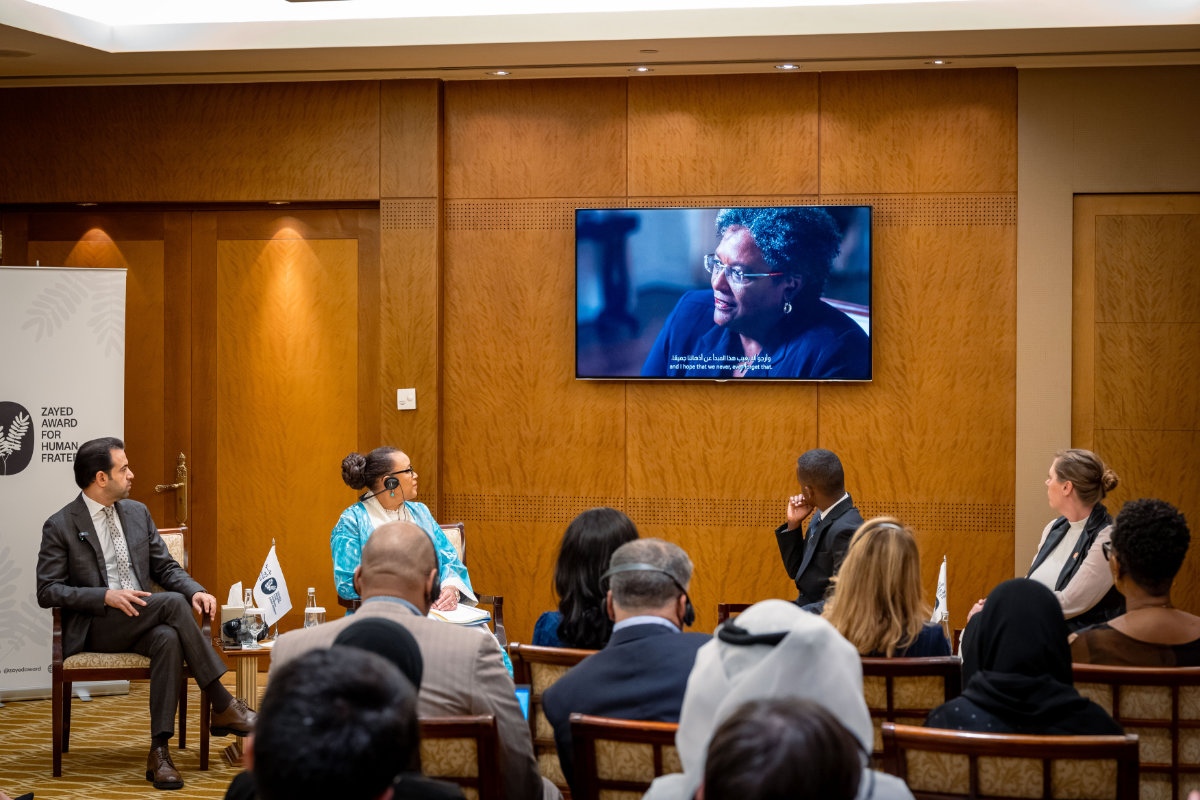
By pioneering debt-for-climate swaps, Mottley has enabled nations burdened by debt to reallocate funds toward climate adaptation and sustainability projects.
The award committee said Mottley’s leadership is a testament to how governance, when rooted in sustainability and equity, can create lasting change, and that her selection reinforces the global urgency of addressing climate change as an issue of human fraternity and justice.
Also among this year’s honorees is World Central Kitchen. Founded by Jose Andres in 2010, the charity has redefined humanitarian relief by providing immediate, fresh, and locally-sourced meals to people affected by disasters and crises.
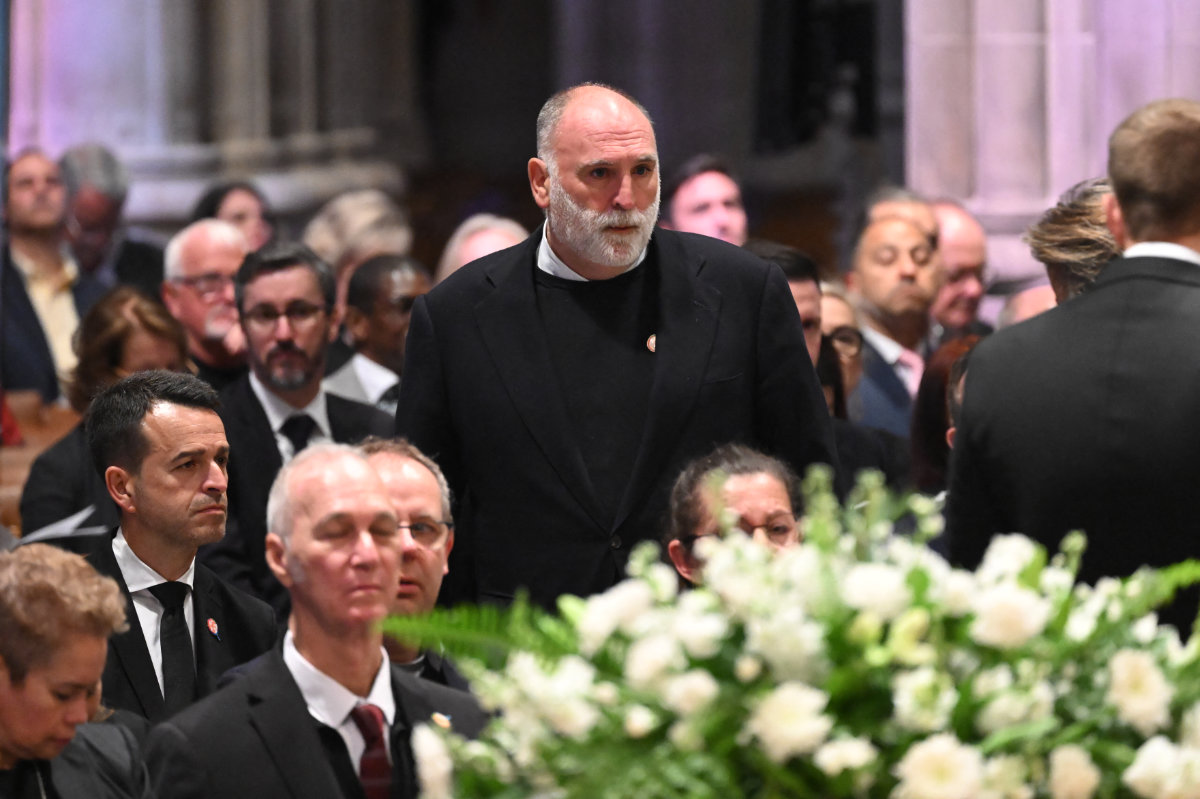
With more than 300 million meals served in over 30 countries, WCK’s work has proven essential in responding to humanitarian emergencies.
A particularly poignant example of the charity’s impact came in 2023 and 2024 when WCK delivered more than 70 million meals to Palestinians in Gaza, collaborating with local chefs and suppliers to ensure swift and effective relief under challenging circumstances.
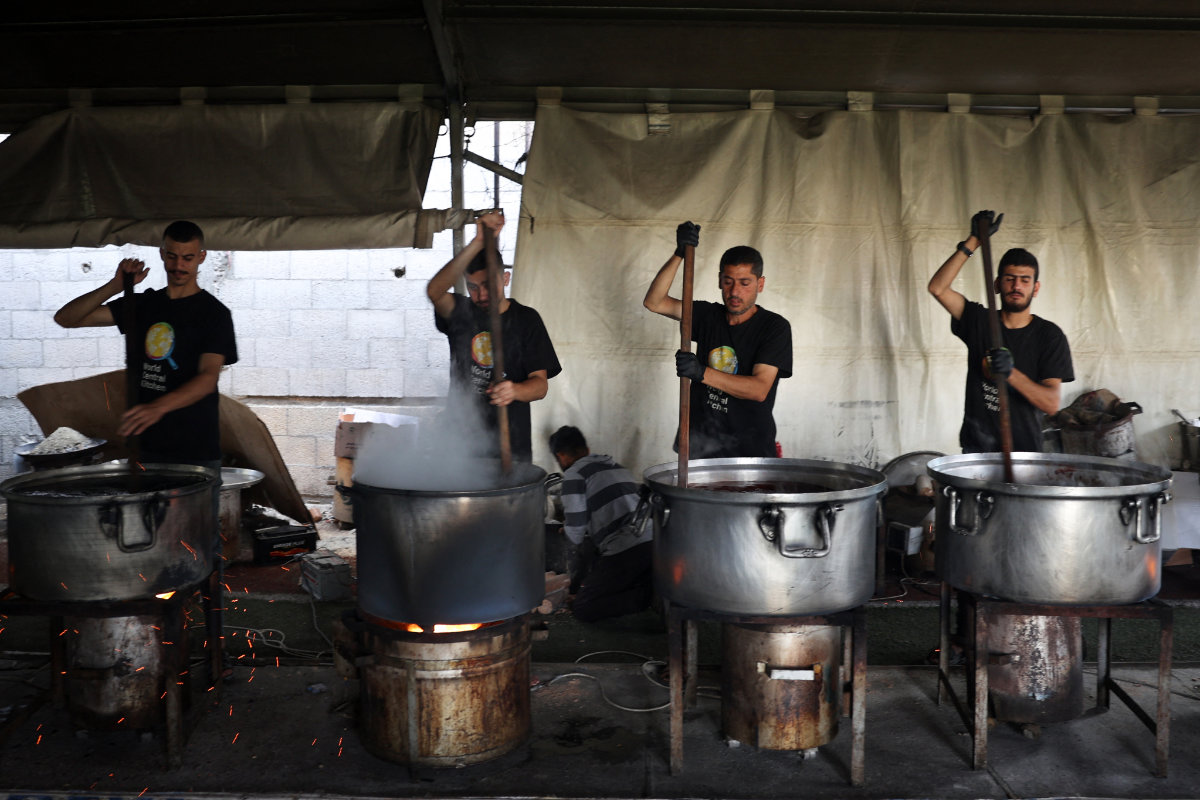
“Through collaborations — including with the UAE — and its innovative ‘first-on-the-ground’ approach, WCK has demonstrated its capabilities in providing meals to the people who need them most,” the award committee said.
The organization’s commitment to dignity and community resilience has earned it admiration worldwide. By working alongside local communities, WCK ensures that its relief efforts do not just provide temporary aid but strengthen long-term food security.
In a first for the Zayed Award, a youth category was introduced this year to honor the contributions of the next generation.
At just 15 years of age, Ethiopian-American innovator Heman Bekele has already made a significant contribution to global healthcare.

In 2024, at the age of 14, he developed a cost-effective soap to help prevent and treat early-stage skin cancer, a breakthrough that earned him TIME’s “Kid of the Year” and various accolades in science competitions.
Now working alongside researchers at Johns Hopkins Bloomberg School of Public Health in Baltimore, Bekele aims to scale up his innovation to reach communities most in need.
“His ambition to save lives and his vision of accessible and affordable healthcare” were central to his selection as the first youth honoree of the Zayed Award for Human Fraternity, the award committee said.
Bekele’s work exemplifies the award’s commitment to recognizing contributions at any age. Indeed, his inclusion sends a strong message that the next generation is not just the future of humanitarian innovation but an active and powerful force in the present.
Since its inception, the Zayed Award for Human Fraternity has sought to amplify the voices and initiatives of individuals and organizations that inspire hope and action.
“Beyond recognizing outstanding contributions to human solidarity and fraternity, the award actively fosters global dialogue through dedicated platforms,” Abdelsalam, the award’s secretary general, told Arab News.
One such initiative is the Human Fraternity Majlis, which brings together global leaders, Nobel laureates, and youth representatives to explore solutions to pressing global challenges.

Another is the annual Zayed Award for Human Fraternity Roundtable, which provides a space for honorees and judges to collaborate on advancing the principles of human fraternity worldwide.
“In just five years, the Zayed Award for Human Fraternity has grown into a worldwide movement that encourages collaboration, fraternity, and communication between individuals from different cultures, religions, and backgrounds,” said Abdelsalam.
“Millions of people worldwide have benefited from the projects spearheaded by past honorees.”
AWARD IMPACT
* Since receiving the award in 2024, Egyptian-British cardiothoracic surgeon Sir Magdi Yacoub has been able to expand his life-saving care to underserved communities.
The award does not just celebrate achievements — it actively supports and expands their reach. A striking example of this is last year’s honoree, renowned cardiac surgeon Professor Sir Magdi Yacoub.
His groundbreaking work in heart surgery and his initiatives to provide life-saving care to underserved communities were amplified through the award’s recognition.
With financial backing from the Zayed Award, Yacoub expanded his work to establish the Rwanda Heart Center in Kigali — a project modeled after his successful Aswan Heart Centre in Egypt.
“The prize means we can do more research, speed up the building of the Rwanda Heart Centre, and continue making an impact,” Yacoub said in 2024.
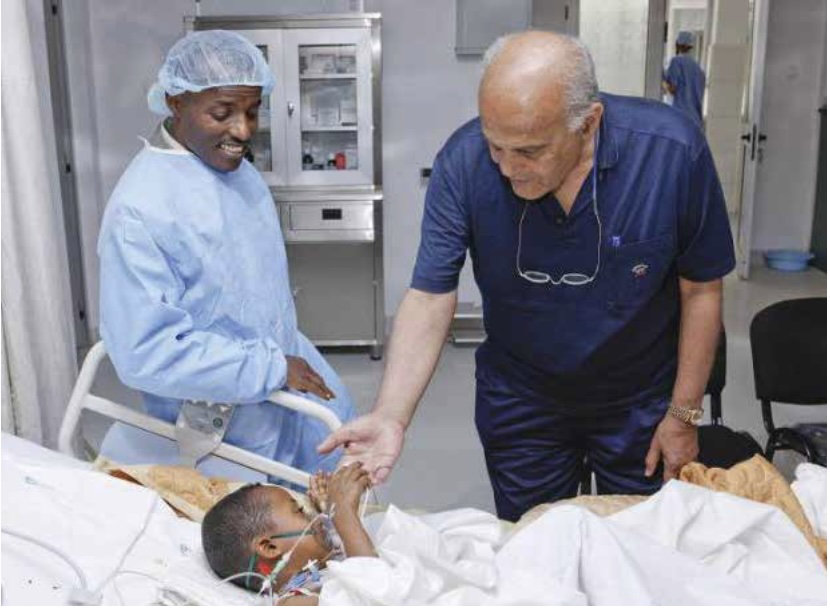
Such outcomes highlight the real-world impact of the Zayed Award for Human Fraternity. It is not merely an honor — it is an investment in solutions that drive tangible change.
In recognizing Mottley, WCK, and Bekele, the Zayed Award for Human Fraternity reaffirms the importance of leadership, innovation, and service to humanity.
Whether through shaping climate policy, feeding those in crisis, or developing life-saving healthcare solutions, these honorees exemplify what it means to act for the greater good.
As the 2025 ceremony approaches, the award serves as a reminder that impactful change can come from governments, non-profits, or even a determined teenager with a vision for a better world.
More than ever, these efforts need to be celebrated, supported, and replicated. Or, as Abdelsalam put it: “Now more than ever, these contributions serve as a beacon of hope in a world facing increasing division.”

Tunisia sets sights on becoming world’s top seawater therapy spot

- Thalassotherapy is an “ancestral heritage” for Tunisians, “since hydrotherapy has existed in Tunisia since antiquity, at the time of the Carthaginians and the Romans,” Shahnez Guizani, the head of the National Office of Thermalism (ONTH), told AFP
KORBOUS, Tunisia: With a Mediterranean coastline, natural thermal springs, clement weather and affordability, Tunisia has become the world’s second-largest destination for seawater-based treatments known as thalassotherapy.
Now, it is setting its sights on overtaking France to claim the top spot.
“The main advantage of Tunisia is its coast and thalassotherapy,” compared with neighboring countries, said Mario Paolo, an Italian, at the Korbous thermal spa, perched on a hill an hour’s drive from the capital, Tunis.

A 78-year-old retiree who has lived in Tunisia for the past five years, Paolo said he frequently visits Tunisian thalassotherapy centers “to get back in shape.”
“Enjoying sea water and natural springs is not just leisure but also a therapy,” Paolo said after a thyme and rosemary oil massage.
Korbous, a coastal town on the Cap Bon peninsula, has historically been one of Tunisia’s hot spots for the therapy, which uses sea water and other marine resources.
Thalassotherapy is an “ancestral heritage” for Tunisians, “since hydrotherapy has existed in Tunisia since antiquity, at the time of the Carthaginians and the Romans,” Shahnez Guizani, the head of the National Office of Thermalism (ONTH), told AFP.

Other popular thalassotherapy destinations in the country include Sousse, Hammamet, Monastir, and Djerba, which Tunisian news agency TAP said was named the Mediterranean thalassotherapy capital in 2014 by the World Federation of Hydrotherapy and Climatotherapy.
Rouaa Machat, 22, said she traveled from France to Korbous for a three-day wellness retreat.
“I’m here to enjoy the types of water this beautiful town offers,” she said, referring to the use of seawater, spring water, and desalinated water for therapy.
“But I am also here for this,” she added, grinning and pointing to the Korbous sea and mountains.

Customers mainly come for the quality of spring water, said Raja Haddad, a doctor who heads the thalassotherapy center at the Royal Tulip Korbous Bay hotel.
Today, Tunisia boasts 60 thalassotherapy centers and 390 spas, 84 percent of which are located in hotels, according to the ONTH.
Tourism accounts for seven percent of the country’s GDP and provides nearly half a million jobs, according to official figures.
The sector has seen a decade of setbacks due to terrorist attacks and later the COVID-19 pandemic.
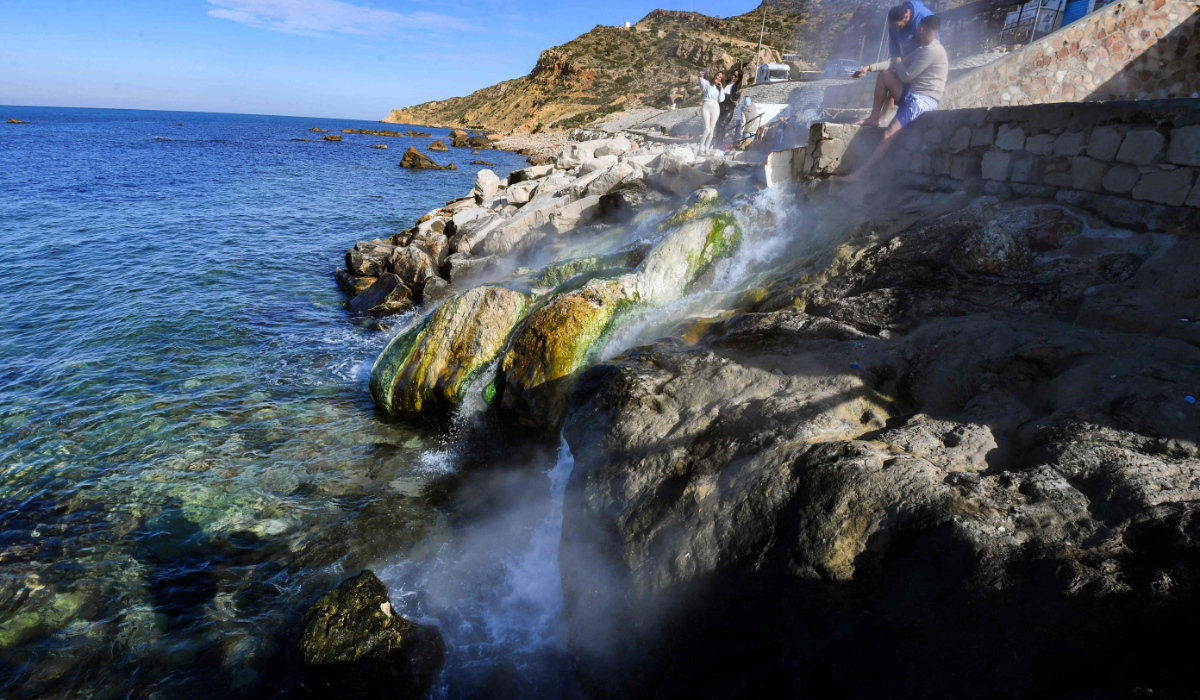
But it has been recovering again as the number of foreign visitors exceeded 10 million last year — a record for the country of 12 million people.
Guizani said thalassotherapy on its own draws about 1.2 million foreign visitors a year, with “70 percent coming from Europe, including 40 percent from France.”
The industry generates approximately 200 million dinars ($63 million, 60 million euros) per year, she added.
That compares with a French thalassotherapy market valued at around 100 million euros last year, according to market research firm Businesscoot.
At a luxury hotel near Monastir, a thalassotherapy center buzzes with customers despite the cold winter season.
Visitors have come from France, Germany, the United Kingdom, Canada, among other countries.
“As soon as you arrive, you find palm trees and the sun,” said Monique Dicrocco, a 65-year-old French tourist. “It’s pure happiness, and it’s also worth your money.”
“Here the therapy is much cheaper than in France, with 1,000 euros a week all inclusive instead of 3,000,” she added.
Jean-Pierre Ferrante, 64, from Cannes, said he found “the quality of the water and the facilities just as good as in France.”
Kaouther Meddeb, head of the thalassotherapy and spa center at the Royal Elyssa Hotel in Monastir, said the number of clients has been growing lately.
Yet despite meeting international standards, the sector remains underappreciated in Tunisia, she said.
“There’s a lack of communication and promotion,” she added.
Experts say more investment is needed in infrastructure. This includes road improvements and air services, they say, as there are few low-cost flights.
But plans are already underway to develop eco-friendly thermal resorts in regions like Beni M’tir, a mountainous village in the northwest, and near Lake Ichkeul south of Bizerte, said Guizani.
“With all the advantages it has, Tunisia is poised to become the world leader in thalassotherapy,” she added.
After Gaza hostage release, Israeli family demand ‘answers’ on wife, sons

- The boys — Kfir, the youngest hostage whose second birthday fell in January, and his five-year-old brother Ariel — have become symbols of the hostages’ ordeal
RAMAT GAN, Israel: Relatives of an Israeli hostage freed in the latest Gaza ceasefire swap made an emotional plea Monday for answers from Israeli authorities on the fate of his wife and sons.
Yarden Bibas, 35, was released by Gaza militants on Saturday, after being held captive in the Palestinian territory for more than 15 months.
Together with his wife Shiri and their two sons Ariel and Kfir, they were all seized by militants during Hamas’s October 7, 2023 attack on southern Israel that triggered the war.
Hamas has previously declared that Shiri Bibas and the two children had been killed in an Israeli air strike in November 2023, but Israel has not confirmed their deaths.
“We will no longer accept uncertainty. We demand answers. We demand them back,” Shiri Bibas’s sister, Dana Silberman-Sitton, told reporters at the Sheba hospital in central Israel.
“The state failed to protect them. The state has been failing for almost 16 months to bring them home.”
“It’s the responsibility of the government and the state to Shiri, Ariel and Kfir, to Yarden, to me and our entire family, and to all the citizens of Israel,” she added, her voice breaking.
Gal Hirsch, the government’s hostage coordinator, said on Saturday that “we have been searching for them for a long time” and demanding “information about their condition from the mediators.”
Footage filmed by Hamas militants during their attack showed Shiri Bibas clutching her two red-haired boys outside their home near the Gaza border.
The boys — Kfir, the youngest hostage whose second birthday fell in January, and his five-year-old brother Ariel — have become symbols of the hostages’ ordeal.
During the Hamas attack, militants took 251 hostages, 76 of whom remain in Gaza, including 34 the Israeli military has confirmed are dead.
Shiri Bibas’ parents, Yossi and Margit Silberman, died in a fire in their home in Nir Oz kibbutz, in southern Israel, when it came under attack on October 7, 2023.
Since the first, 42-day phase of Gaza ceasefire began on January 19, militants have so far freed 18 hostages, in four hostage-prisoner swaps.
During the current phase a total of 33 hostages are to be freed in return for some 1,900 Palestinian prisoners.
Israeli army maneuvers on Lebanese border amid claims of dismantling Hezbollah military structures

- Lebanon interior minister: New checkpoints at Beirut Airport to control all incoming items
BEIRUT: Security authorities at Beirut’s Rafic Hariri International Airport effectively fulfill their responsibilities, caretaker Interior Minister Bassam Mawlawi said on Monday.
Mawlawi’s assurance followed his meeting with the Central Security Council.
In response to Israeli claims that Hezbollah was receiving cash through the airport, Mawlawi emphasized that the council had set up new checkpoints to inspect all items entering through the airport.
He stressed that the Lebanese army was fulfilling its duties to control the Lebanese border with the Syrian Arab Republic “despite the challenges” and urged increased cooperation from Syrian authorities.
Syria’s Ministry of Interior announced on Sunday that it had seized shipments of weapons intended for smuggling into Lebanon through land routes in the Talkalakh area of Homs.
On Jan. 26, Syrian security forces reportedly discovered a missile depot at a former regime site in Homs. They also seized a weapon shipment that was “intended for Hezbollah.”
There are six official border crossings between the Syrian Arab Republic and Lebanon and numerous illegal crossings along a 375-km border.
On Monday, the Israeli army said that it was continuing its “defensive operations” in southern Lebanon, under agreements with Lebanon, to maintain the operational gains in the region.
Recently, the Israeli army said it conducted extensive operations to eliminate threats in the region, “dismantle Hezbollah’s infrastructure, and prevent any potential dangers to Israel and its citizens.”
The announcement came a day after Defense Minister Israel Katz toured Israeli military positions in southern Lebanon, where Israeli forces continue to violate the ceasefire agreement.
The ceasefire between the Israeli army and Hezbollah was extended at Israel’s request through US mediation until Feb. 18.
Israel is exerting pressure on Lebanon to disarm Hezbollah and eliminate its military presence south of the Litani line. Israeli threats to disarm Hezbollah extend beyond this region to areas north of the Litani and even to the Lebanese border with Syria.
Since the ceasefire began, Israeli airstrikes have repeatedly targeted vehicles transporting weapons and ammunition, as well as storage facilities for stockpiling arms.
In its statement, the Israeli army clarified that during a survey operation in the border area, troops from the 769th Brigade discovered weapons storage facilities. These facilities contained mortar shells, rockets, explosives, firearms, and a significant amount of military equipment. All the weapons were confiscated, and the storage sites were dismantled.
The statement indicated that Israeli soldiers “eliminated several Hezbollah members in the area and apprehended suspects who posed a threat to Israeli forces.”
The Israeli army announced it was conducting a military exercise on Monday in the Upper Galilee region, which has remained in a state of tension following months of military operations against Hezbollah.
The Israeli army issued a warning against civilian entry into areas expected to see “increased military activity.”
Israeli media reports indicate that residents of northern settlements in Israel have begun repairing their homes after damage caused by “fire from Hezbollah.”
The Israeli military has withdrawn from the western region of southern Lebanon and from certain villages in the central area while still maintaining its presence in other towns.
At the same time, it is engaged in bulldozing and demolition activities in the eastern sector, where it has not retreated from any villages.
It seems likely that the military will continue to occupy strategic positions in southern Lebanon.
Former MP Mustafa Alloush stated that Israel’s release of information about the significance of maintaining control over strategic heights and five key points overlooking the southern territories, as well as a substantial portion of occupied Palestine, was quite plausible.
He stated that Hezbollah was giving Israel reasons to justify its actions, evident both in the deployment of drones and in the group’s insistence on maintaining resistance without disarming.
Additionally, remarks from Hezbollah’s leadership, including statements made by its secretary-general, ministers, and MPs, emphasized that the resistance was regaining its strength and readiness.
Alloush claimed that Israel was leveraging this situation to conduct its daily airstrikes, which have targeted areas from Nabatieh and the Bekaa to northern Lebanon.
The Israeli army still holds El-Hamames Hill, located at the southwestern entrance to the town of Khiam.
This strategic hill overlooks the entire town of Khiam and the Hasbaya region, all the way to Ebel Al-Saqi.
It also holds the strategic Awida Hill, between Adaisseh and Taybeh, in the Marjeyoun district.
It overlooks the entire western sector up to Tyre and the whole central sector up to the Litani River and the western Bekaa from the direction of Jezzine.
The Israeli army also holds the hill of Khallet Wardeh, a strategic point located southwest of the town of Aita Al-Shaab in the Bint Jbeil district and overlooking the southern coast from Tyre to Naqoura and the western sector up to Tayr Harfa and Al-Jbein.
Israeli forces are still penetrating the strategic Shebaa and Kfar Shuba hills, which overlook the entire Arqoub region and the western Bekaa to the north, Hasbaya and Marjeyoun to the west, and Mount Hermon and Syrian lands to the west.
Syrian president says elections could take up to five years

- Ahmed Al-Sharaa said infrastructure for the vote needs rebuilding
- A transitional government has been installed to steer Syria until March 1
DAMASCUS: Syrian Arab Republic President Ahmed Al-Sharaa said Monday that organizing elections could take up to five years, the week after he was appointed interim president and less than two months after ousting Bashar Assad.
“My estimate is that the period of time will be approximately between four and five years until the elections,” Sharaa said in a pre-recorded interview broadcast on a private Syrian television channel.
In late December, he told Al Arabiya TV the election process could take four years.
The infrastructure for the vote “needs to be re-established, and this takes time,” Sharaa added on Monday.
He also promised “a law regulating political parties,” adding that Syria would be “a republic with a parliament and an executive government.”
Military commanders last Wednesday appointed Sharaa interim president, after opposition factions toppled Assad on December 8, ending more than five decades of the family’s iron-fisted rule.
Sharaa’s appointment has been welcomed by key regional players Egypt, Qatar, Turkiye and Saudi Arabia.
Sharaa was also tasked with forming an interim legislature, and the Assad-era parliament was dissolved, along with the Baath party, which ruled Syria for decades.
Syria’s constitution was also repealed, and the Assad-era army and security forces were dissolved, as were armed groups, including Sharaa’s Hayat Tahrir Al-Sham.
A transitional government has been installed to steer Syria until March 1.


